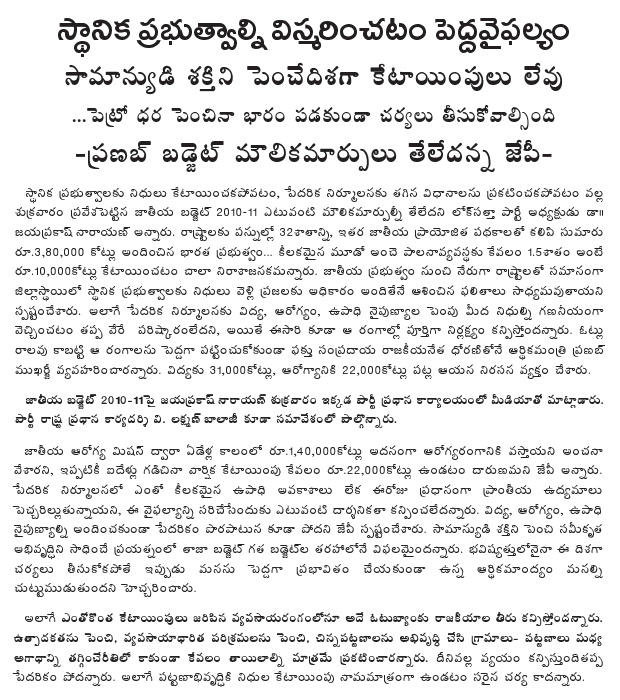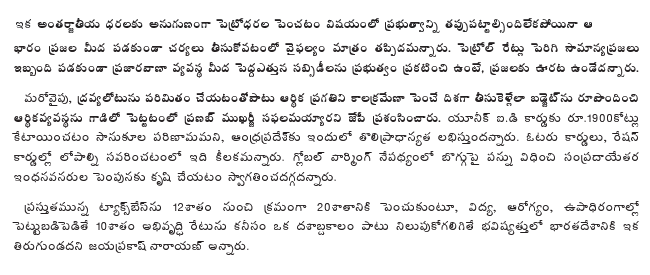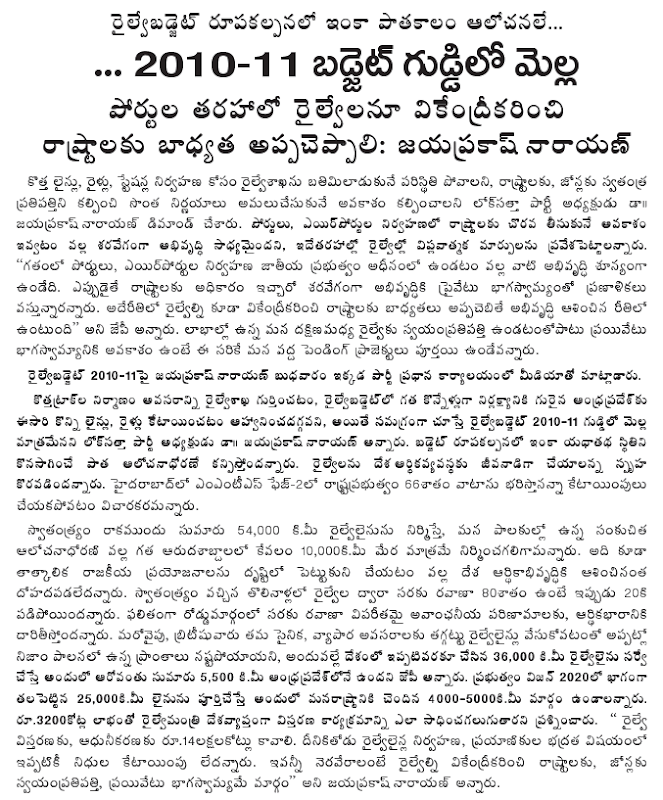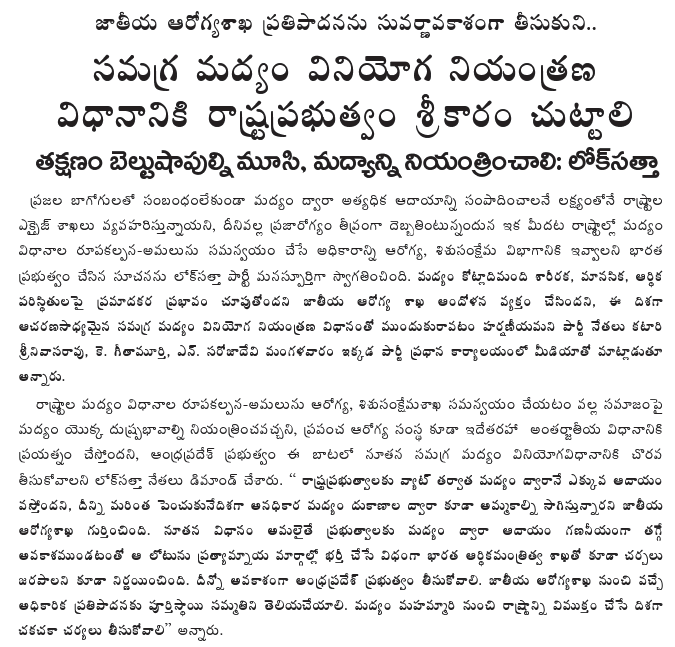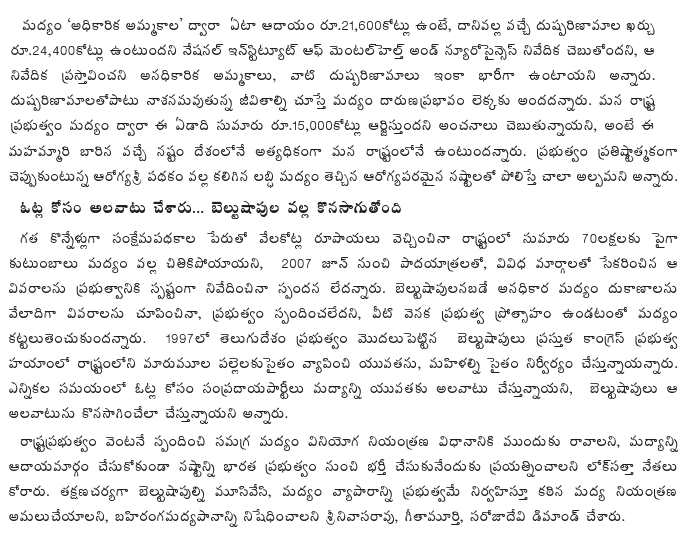Press Releases Archive
Pranab could have empowered local Governments: Dr. JP
Lok Satta Party President Dr. Jayaprakash Narayan was all praise for Union Finance Minister for reining in fiscal deficit and putting the economy back on the growth path but faulted him for failing to empower the third tier of government – the local bodies – with devolution of resources.
Commenting on the Union Budget for 2010-11, Dr. JP pointed out that the 13th Finance Commission recommendations along with Centrally-sponsored schemes would transfer nearly 3.5 lakh crore to Rs.4 lakh crore from the Government of India to States. Of it, a mere 1.5 percent amounting to less than Rs.10000 crore was to go to local bodies. Without devolution of resources to local bodies in tune with the 73rd and 74th Constitutional amendments, there would not be any improvement in people’s lives.
Dr. JP complimented Mr. Pranab Mukherjee for taking steps towards fiscal consolidation with calibrated withdrawal of stimulus packages and bringing down the fiscal deficit from 7.8 % in 2008-09 to 6.9 percent in 2009-10 and planning to reduce it to 5.4% in 2011-12. He also gave credit to the Finance Minister for the country inching towards a growth rate of 7.2% in 2009-10 notwithstanding poor rainfall in many parts of the country, and aiming at a growth rate of 8.5 percent in 2011-12.
Dr. JP, who described the increase in petroleum product prices as inevitable whichever party happened to be in power, regretted that the Union Finance Minister had not paid any attention to subsidizing public transport. The Union Finance Minister, who levied a cess on coal to encourage clean technologies in the context of global warming, should have thought of public transport as a complementary means to curb emission of harmful gasses by the ever proliferating private transport vehicles.
Although Mr. Pranab Mukherjee held forth on poverty eradication – the ruling party’s mantra since 1971 --, he was short on action. Poverty could not be eradicated unless the Government focused on providing quality education and health care to every child and on enhancing skills of the millions of the unemployed. It was the fear over livelihood prospects that prompted the youth to take to agitations in Andhra Pradesh.
Mr. Pranab Mukherjee, one of the senior most politicians with rich experience, did not display vision in making a frontal assault on poverty through promotion of education and healthcare. Instead, he confined himself to schemes like the NREGS that fetched votes.
Mr. Pranab Mukherjee has also failed to focus on improving agricultural productivity and contented himself with allocating a token Rs.400 crore to Eastern India.
Dr. JP, who welcomed the relief given to income tax payers, wondered why the Union Finance Minister had not bothered about raising the tax base. The Union Government’s direct tax revenue constituted a mere 12% of the GDP whereas it is 40% in the U.S. and nearly 50% in the U.K.
Liberalize the railways, demands Dr. JP
The Indian railway system continues to be in a crisis since it has kept the winds of liberalization at bay, said Lok Satta Party President Dr. Jayaprakash Narayan said here today. When Delhi let go its stranglehold on airports and sea ports and permitted States to promote them, the country has witnessed a dramatic growth in the two sectors.
Commenting on the railway budget presented by Ms. Mamata Banerjee, Dr. JP said the railways’ failure to be the lifeline of the economy has resulted in the road sector overtaking the railways in goods movement. The railways which once carried 80 percent of the cargo now handled only 20 percent. Neither the NDA Government nor the UPA Government has taken cognizance of the enormous losses the nation is put to because of road transport. Road traffic resulted in regular accidents and huge loss of life, involved huge expenditure, warranted fuel imports, caused pollution and wear and tear of roads.
Dr. JP also suggested that each zonal railway be given total autonomy and treated as an independent profit center. The South Central Railway earned a daily profit of Rs.5 crore while the Eastern Railway incurred a daily loss of Rs.6 crore. For want of autonomy, the SC Railway has not been able to address the pressing needs of people in the region whereas thanks to political patronage the Eastern Railway continued to bag many projects.
Dr. JP welcomed the Railway Minister’s proposal to encourage railway development under the public-private partnership mode since there is no alternative. A white paper published by the Railways has estimated that it has to invest Rs.14 lakh crore in the next 10 years on construction of new lines, acquisition of rolling stock etc. There is no way in which the railways can raise such resources and become the country’s lifeline.
For instance, the 13 projects under construction in Andhra Pradesh call for an investment of Rs.3600 crore, not to talk of the new lines proposed in the current budget. The budget allocated a total of Rs.4300 crore for the entire country for construction of 1000 km of lines in the coming financial year. At this rate, completion of the projects already taken up will take a decade or two.
Dr. JP disclosed that Andhra Pradesh accounted for 5500 km of the total 36000 km of railway lines already surveyed but there is no prospect of the lines materializing in the near future. An autonomous SC Railway, for instance, could complete them in a few years because it can raise loans to match its Rs.2000 crore annual profit.
The Lok Satta leader also took exception to the Railway Minister’s attempt to placate all States by allocating nominal amounts to one project or the other in each of them. Saying that bad politics drives away good economics, he said that the Carriage Repair Workshop at Tirupati could be developed into a coach manufacturing plant with a few hundred crores of investment. Instead, the Railway Minister proposed construction of a new plant in West Bengal at a cost of a few thousands of crores of rupees.
Again, the Union Railway Minister sought to please MPs by introducing a large number of passenger train services unmindful of the huge losses in running them. The railways should focus on long-distance travel with express services and leave short distance travel to the road sector.
Dr. JP said it was a fact that Andhra Pradesh had received a better deal than in the past. Yet, without a paradigm change in the working of the railways, the country could not progress.

